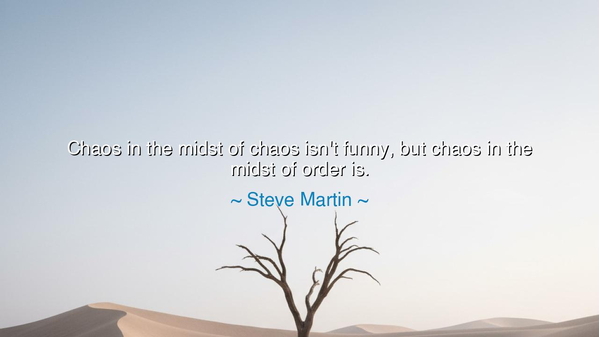
Chaos in the midst of chaos isn't funny, but chaos in the midst






The philosopher of laughter and paradox, Steve Martin, once said: “Chaos in the midst of chaos isn’t funny, but chaos in the midst of order is.” What at first sounds like the wit of a comedian is, in truth, a profound observation about contrast, balance, and the delicate harmony between structure and surprise. His words do not merely describe what makes us laugh — they reveal a truth about life itself: that meaning, humor, and even beauty arise not from sameness, but from the collision of opposites. For without order, chaos is only noise; but when chaos disrupts order, the world trembles — and we, astonished, begin to see clearly.
To understand Martin’s wisdom, one must first grasp the nature of chaos. Chaos, in its purest form, is the absence of pattern — the unformed, the wild, the unrestrained. When life is already chaotic, an additional act of madness blends into the storm; it loses shape and becomes invisible. But when chaos bursts forth in a moment of calm — when something absurd breaks into the solemn rhythm of order — it startles the soul awake. It is this surprise, this sudden rupture of normality, that evokes laughter, reflection, or revelation. Thus, chaos amidst order is not destruction; it is creation. It is the spark that lights the fire of meaning within monotony.
The ancients understood this dance between order and disorder. The Greeks called it cosmos and chaos — the twin forces that shape existence. From chaos came creation, yet it was only through the shaping hand of order that the world could endure. In comedy, as in life, this truth plays out endlessly. When the serene philosopher slips upon the marble floor of his own temple, or when the proud general’s speech is interrupted by a stray bird, we laugh — not because we are cruel, but because the universe itself has reminded us that perfection is fragile. In those moments of disruption, we glimpse our shared humanity — the truth that even in a world built on reason, the unpredictable still reigns.
Consider, for instance, the great tale of Diogenes the Cynic, who lived in Athens at the height of its order and refinement. When the mighty Alexander the Great came to meet him, expecting reverence, Diogenes merely said, “Stand out of my sunlight.” In that instant, chaos entered the temple of order — humility mocking power, simplicity shattering grandeur. The crowd laughed, but their laughter carried wisdom: that truth often appears in absurd form. This, too, is what Steve Martin teaches — that the absurd, when set against structure, is not meaningless. It is revelation disguised as jest.
In the modern world, Martin’s quote transcends comedy and becomes a meditation on creativity and life. We spend much of our days constructing order — routines, systems, expectations — and yet it is the unexpected that gives life its vibrancy. A child’s laughter in a silent hall, a sudden rain during a ceremony, a mistake that becomes invention — these are moments of “chaos in the midst of order.” They remind us that life is not a machine but a melody, and that even discord can deepen the song. Without such interruptions, the world would be sterile — efficient, perhaps, but lifeless. The sacred rhythm of being depends upon the interplay between discipline and surprise.
Yet, Martin’s insight carries a second layer — a moral one. For it is not only art or humor that requires this balance, but wisdom itself. A person who clings too tightly to order becomes rigid, humorless, incapable of wonder. But one who lives only in chaos loses meaning, direction, and peace. The enlightened soul learns to walk between the two — to maintain structure, yet allow room for disorder to breathe. The funny, in Martin’s vision, is not just what makes us laugh — it is what makes us alive: the constant reminder that perfection is an illusion, and that grace often enters through the cracks.
The lesson, then, is this: do not fear chaos when it visits your order. When your plans are disrupted, when your perfect day goes astray, pause — and see the humor that the universe has placed before you. For laughter is not the enemy of order; it is its companion. It teaches humility, acceptance, and the ability to see beauty in imperfection. Like the artist who splashes paint beyond the line or the philosopher who questions his own logic, learn to let the unexpected shape you, not destroy you.
So, my child, when life’s stillness is broken by noise, when your carefully built order trembles under the weight of the unpredictable, remember Steve Martin’s wisdom. Do not despair, but smile. For in that sudden burst of chaos amidst order, life reveals its truest comedy — that the universe, in all its seriousness, still has a sense of humor. Embrace it. Laugh at it. For laughter, born from contrast, is not mockery — it is enlightenment, the soul’s joyful recognition that even in disorder, there is divine design.






AAdministratorAdministrator
Welcome, honored guests. Please leave a comment, we will respond soon